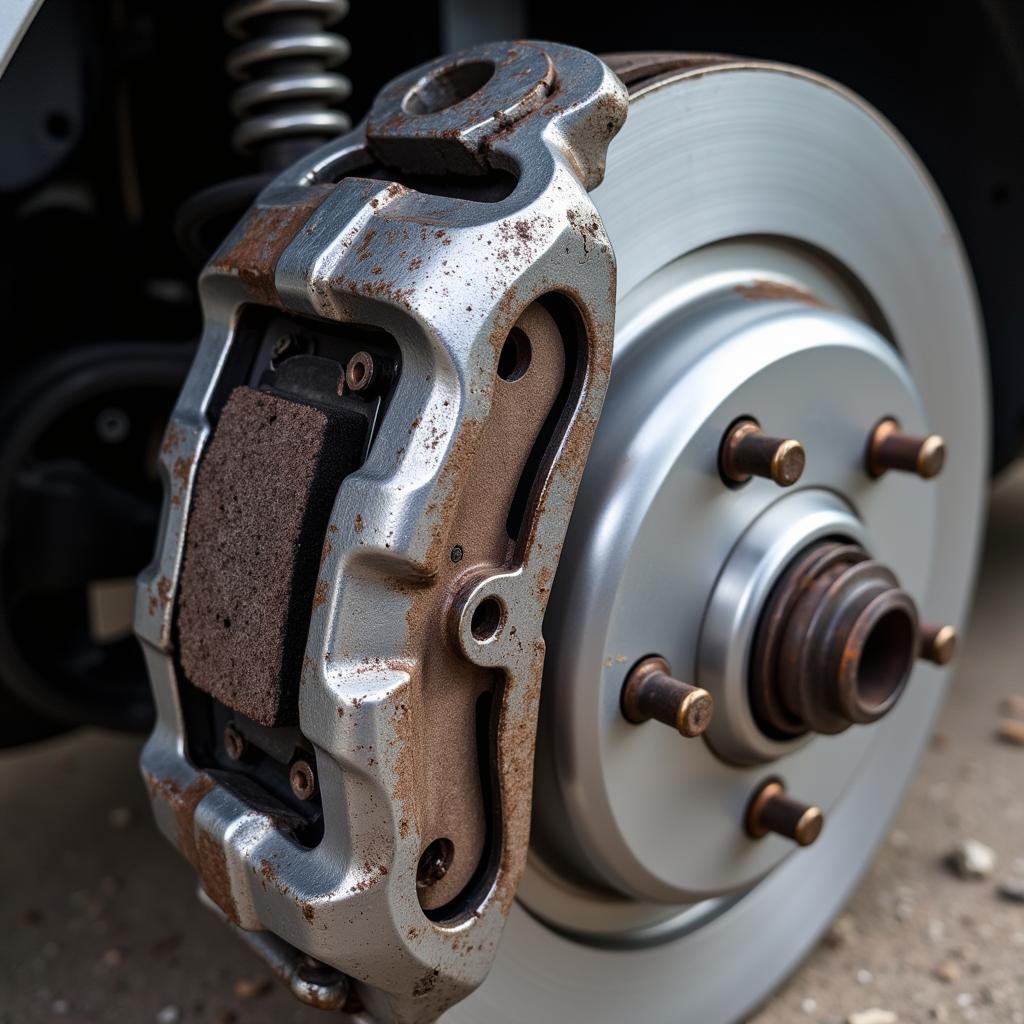The dreaded parking brake warning light on your Mercedes dashboard can be a source of anxiety. Understanding why this light illuminates and how to address the issue can save you time, money, and frustration. This comprehensive guide covers everything you need to know about the Mercedes parking brake warning light, from simple checks to more complex diagnostic procedures. mercedes parking brake warning light
Common Causes of the Parking Brake Warning Light
The most obvious reason for the parking brake warning light is, of course, that the parking brake is engaged. However, if the light persists even after releasing the brake, several other factors might be at play. These can range from low brake fluid to faulty sensors and wiring issues.
Low Brake Fluid
One of the primary reasons for the parking brake warning light is low brake fluid. Your brake system operates using hydraulic pressure, and insufficient fluid can compromise its effectiveness. Check your brake fluid reservoir. If the level is below the minimum mark, it’s crucial to top it off with the correct fluid type specified in your owner’s manual.
Faulty Parking Brake Switch
A malfunctioning parking brake switch can also trigger the warning light. This switch detects whether the parking brake lever is engaged or released. If it’s faulty, it might send incorrect signals to the car’s computer, illuminating the warning light even when the brake is disengaged.
Worn Brake Pads or Rotors
Worn brake pads or rotors can also activate the parking brake warning light, especially in newer Mercedes models equipped with electronic parking brakes. The system might interpret the reduced braking efficiency as a potential issue with the parking brake.
 Worn Brake Pads on a Mercedes
Worn Brake Pads on a Mercedes
Wiring Problems
Corrosion or damage to the wiring connected to the parking brake system can also cause the warning light. This can disrupt the communication between the parking brake components and the car’s computer.
How to Troubleshoot the Parking Brake Warning Light
If the light persists after checking the parking brake lever and fluid level, further troubleshooting is necessary.
Visual Inspection
Start with a visual inspection of the parking brake mechanism, cables, and wiring. Look for any signs of damage, corrosion, or loose connections.
Diagnostic Scanning
The most effective way to diagnose complex issues is to use a diagnostic scanner. This tool can read the fault codes stored in the car’s computer, providing specific insights into the problem. mercedes benz parking brake warning light
Professional Assistance
If you’re not comfortable working on your car’s braking system or lack the necessary tools, it’s best to seek professional assistance. A qualified Mercedes technician can accurately diagnose and resolve the issue.
Why is My Mercedes Parking Brake Light Still On After Replacing Brake Pads?
Sometimes, the parking brake warning light might remain on even after replacing the brake pads. This could be due to a reset procedure required after brake pad replacement, or it could indicate a separate issue unrelated to the pads themselves, such as a persistent fault code related to the parking brake system. brake warning light mercedes sprinter
What if the Brake and Battery Light Come On Together?
If you see both the brake and battery light illuminated simultaneously, it could indicate a serious problem with the charging system, potentially affecting the brake assist system. This warrants immediate attention. brake light and battery light on at same time
Expert Insights
“Ignoring a persistent parking brake warning light can lead to further complications,” advises John Miller, a seasoned Mercedes technician with over 20 years of experience. “Addressing the issue promptly can prevent costly repairs down the line.”
“Modern Mercedes vehicles often have sophisticated electronic parking brake systems,” adds Sarah Chen, an automotive electronics specialist. “A diagnostic scan is often necessary to pinpoint the exact cause of the warning light in these systems.” mercedes actros parking brake warning light
Conclusion
The Mercedes parking brake warning light serves as an essential indicator of potential issues within your braking system. Understanding its causes and implementing the appropriate troubleshooting steps can help you maintain the safety and performance of your vehicle. Don’t ignore this warning; addressing it promptly can prevent more significant problems and ensure a safe driving experience.
FAQ
- What should I do if my parking brake warning light stays on? First, ensure the parking brake is fully disengaged. Then, check your brake fluid level. If the issue persists, consult a qualified mechanic.
- Can low brake fluid cause the parking brake warning light to come on? Yes, low brake fluid can trigger the parking brake warning light as it can affect the overall brake system performance.
- How do I reset the parking brake warning light on a Mercedes? Often, addressing the underlying issue will automatically reset the light. However, sometimes a diagnostic scan is needed to clear the fault codes.
- Is it safe to drive with the parking brake warning light on? While you might be able to drive, it’s not recommended. The warning light indicates a potential problem that could compromise your braking ability.
- How much does it cost to fix a parking brake warning light issue? The cost varies depending on the underlying cause. It could range from a simple top-up of brake fluid to more complex repairs involving sensors or wiring.
- Can I check the parking brake myself? You can perform basic checks like inspecting the brake fluid and visually examining the parking brake components. However, for more in-depth diagnostics, professional assistance is recommended.
- What are the common causes of a parking brake warning light in a Mercedes Sprinter? Similar to other Mercedes models, the causes can range from low brake fluid and faulty switches to worn brake components and wiring issues.

